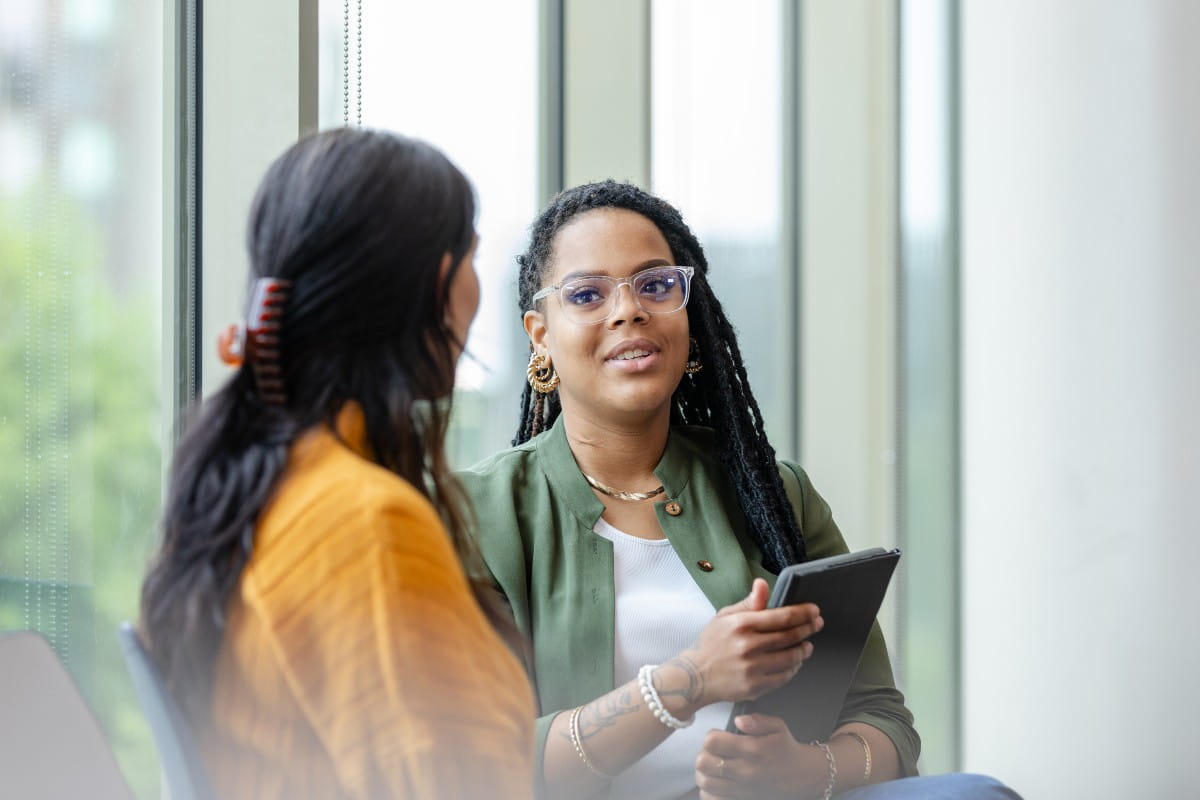Frankye Myers: From Riverside Health System, this is the Healthy You Podcast, where we talk about a range of health related topics focused on improving your physical and mental health. We chat with our providers, team members, patients, and caregivers to learn more about how to maintain a healthy lifestyle and improve overall physical and mental health. So let's dive in to learn more about becoming a healthier you.
Jamila Wynter, Fellowship trained gastroenterologist with Riverside Gastroenterology Specialists. Welcome.
Jamila Wynter: Thank you so much for having me, Frankye. I'm excited to join you and to talk about a very important topic of colon cancer, especially in the younger population.
Frankye Myers: Absolutely. Well, thank you for taking time out of your busy schedule to talk with us a little bit today.
Jamila Wynter: Of course.
Frankye Myers: So this episode, we're going to be diving into exploring trends of colon cancer in younger adults. Okay. Okay, so a little background. Over the past couple of years, we have unfortunately heard more about younger adults.
Jamila Wynter: That's right.
Frankye Myers: Those in their 20s, 30s, and 40s being diagnosed with colon cancer. And in 2020, actor Chad Boseman, did I say his name right?
Jamila Wynter: Yeah, I think that's right.
Frankye Myers: Died at the age of 42 after a four year battle with colon cancer. Um, the incident of colorectal cancer in young adults is on the rise, so we will be chatting with you about that and look forward to hearing, you know, just around symptoms and disease prevention and health promotion.
Jamila Wynter: Absolutely. And so for, for those that you don't know, um, for those of you who don't know, gastroenterology is a field of, um, basically taking care of digestive and intestinal problems. More common causes, uh, for you to see GI include acid reflux disease, um, Crohn's, ulcerative colitis, just to name a few.
Frankye Myers: Okay. Okay. Very good. Yeah. So you get, you get all of that excitement. Exactly. All aspects. Yeah. What is colon cancer?
Jamila Wynter: Right, so colon cancer is, the name suggests it's cancer in the large intestines or colon, right? So the large intestine makes up the colon and the rectum and so that basically just when abnormal cell growth occurs in that location and unfortunately can lead to really bad and poor outcomes similar to other cancers of the body.
Frankye Myers: Okay. Is, uh, family history associated with? Yeah. Is it gender?
Jaila Wynter: Yeah. So, um, no, that's a great question. I know we're going to delve a lot into this, but we do have an understanding of the risk factors for colon cancer. And I would say about maybe 50 percent of patients who are diagnosed with colon cancer, it's due to, uh, an identifiable risk factor.
Frankye Myers: Exactly. Okay. So we always hear about high fiber diet.
Jamila Wynter: Yes. Very important.
Frankye Myers: Um, yes. How important is that?
Jamila Wynter: So again, we don't, it's not fully elucidated, but the assumption is when you have a high fiber diet, um, you're more, more likely to have normal bowel movements, um, and it regulates your bowels and it.
Frankye Myers: Absolutely. And water intake.
Jamila Wynter: And water intake. Keeps everything moving. Absolutely. And that's the case for everything. Right.
Frankye Myers: So if you know if you like red meat and you're eating those foods, the more that you can keep that.
Jamila Wynter: Keep going. Keep moving. Keep moving the better.
Frankye Myers: Okay, okay. So talk a little bit about, more about the digestive tract, and specifically polyps. Yes. Because I know people in my family that have had polyps. And they've been detected early.
Jamila Wynter: Perfect, yep.
Frankye Myers: What is the significance of early detection of polyps?
Jamila Wynter: That's a great question. And that's actually the most important question, to be honest with you.
Frankye Myers: Right. That, that's really great information because sometimes people think, well, they're benign.
Jamila Wynter: An important note, um, is that if you do have a history of polyps, that means you unfortunately have a risk of developing more polyps.
Frankye Myers: So I know over the years the screening times have changed and why is, I think that's great because that must As we're talking about there earlier the younger generation now, we're seeing a presentation earlier.
Jamila Wynter: So yes, so Prior to 2021, the United States Preventative Task Force, which is like the governing body of guidelines, um, recommended that we get colon colon cancer screening at age 50.
Frankye Myers: it's so important to have that relationship with your primary care.
Jamila Wynter: Right. So, um, the most important thing That if anyone gets from this talk is if you see a change in your body that is Abnormal or you know, not normal to you.
Frankye Myers: Okay. Um, are there specific markers? that are explored in, um, confirming cancer?
Jamila Wynter: Yeah, no. Colon cancer? Yes, there are. So, um, the gold standard of, again, uh, therapeutic, or sorry, I should say preventative and diagnostic, um, of colon cancer is the colonoscopy. So the, what we do is when we go in, let's say someone comes in and they are having these symptoms that I mentioned. I perform a colonoscopy.
Frankye Myers: You're able to do this at the time? At the time of the exam.
Jamila Wynter: At the time of the exam oftentimes we'll know. Okay. Just by direct visualization of what's going on.
Okay. But the confirmatory process may take anywhere from three to five days. Where we send that tissue off to a pathology lab. They look at it under the microscope. And based on the findings there, they can confirm that, um, the cells are malignant or cancerous.
Frankye Myers: Right. Are there cells that are more aggressive?
Jamila Wynter: Right. Right. Right. So, um, so I think there are two and there's two pieces to that. The first is just going back to polyps, which again, remember, as I mentioned, are benign, but precancerous.
unfortunately diagnosed with colon cancer. Um, there are stages to that. Okay. And, um, that unfortunately is usually based on the time in which a patient presents. Okay. And oftentimes they present too late and they're at a stage three or stage four, which is pretty, pretty advanced. And so I would say timing is important and I will say, I would be remiss to say, um, Patients who are of, um, different racial ethnic black backgrounds have a when they present are at a risk of having, um, a higher stage or advanced colon cancer.
Frankye Myers: Yes. Yes. Absolutely. Well, this is going to help. Yeah. I hope so. bridge some of those, um, gaps as it relates to information and understanding. So get your screenings.
Jamila Wynter: Yes. So important. Get screened. Absolutely.
Frankye Myers: Um, what are, um, some lifestyle changes, um, that we can encourage our young or adults to participate in, um, to help prevent colon cancer?
Jamila Wynter: Absolutely. So just going back to those risk factors, minimizing those risk factors. So. You know, quitting smoking, um, reducing alcohol consumption. Very important. Making sure you have a well balanced diet that's high in fiber, minimizing the amount of red meat you eat, minimizing the amount of processed foods, increasing more natural foods, foods that come from the earth.
Frankye Myers: Yes, yes. Thank you so much.
Jamila Wynter: Um, I, again, the colonoscopy, it's such a, a vital part of the screening process. Um, About 25 percent of colon cancer cases are preventable. Meaning if we had known about them years prior and done a colonoscopy and taken out a polyp, that would never have led to a colon cancer down the road.
Frankye Myers: Dr. Wynter, if somebody wants to reach out to you directly, um, please tell them how they can get in contact with you.
Jamila Wynter: So, I'm a physician at the Riverside Health System. Um, you can find my bio on the Riverside, uh, website and contact our GI office in the Port Warwick location.
Frankye Myers: Well, I am two years new to this area, and I will be looking, um, for you to do my next colonoscopy and screening and then also looking at partnering with you in the future as it relates to how do we get out in the community, especially in those areas that we know are high risk to further educate, um, in our community efforts.
Jamila Wynter: Thank you.
Frankye Myers: Thank you for listening to this episode of Healthy You. We're so glad you were able to join us today and learn more about this topic.
If you would like to explore more, go to RiversideOnline.com.



